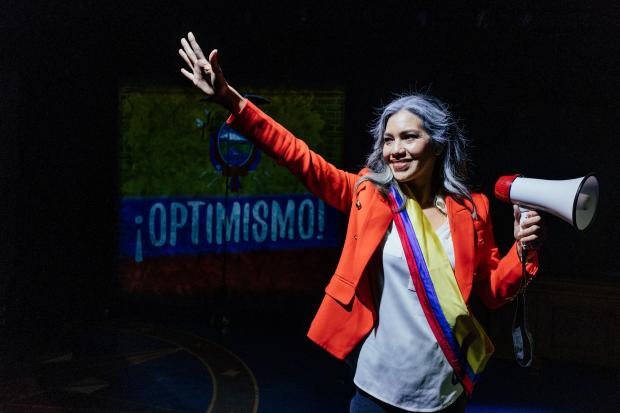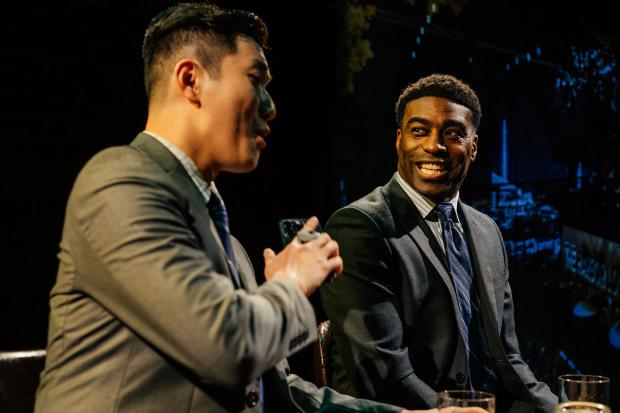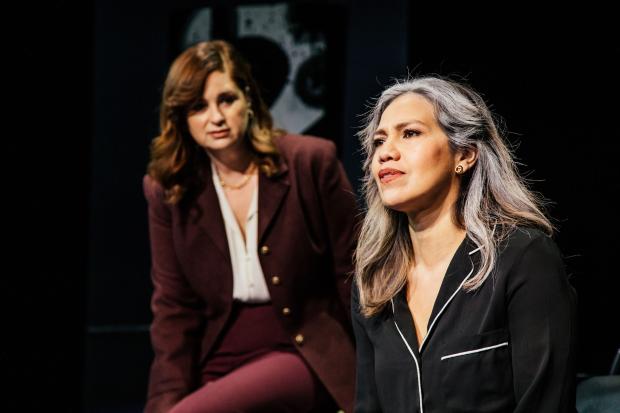Rogue Machine’s first play of its 16th season is a worthy, thought provoking addition to the canon of what is arguably Los Angeles’ best theatre company. There’s an expression that was popularized by second-wave feminists in the sizzling sixties that “the personal is political,” and playwright Juan José Alfonso’s Middle of the World skillfully succeeds in synthesizing both. This one-act drama mixes race, romance, class, idealism, egoism, age and more as Glenn Joyner (Christian Telesmar), a 30-ish African American who works in New York’s financial sector, enters the backseat of a rideshare at JFK Airport.
Joyner – who has that arrogant “masters of the universe” air (that “endearing” characteristic of capitalists) about him – automatically assumes he’s higher up on the totem pole than his driver, a 50-ish year-old woman. But ay caramba, is Glenn in for a surprise – in the immortal words of Bette Davis, “fasten your seatbelts, it’s going to be a bumpy” ride! During the course of the drive and a cute-meet conversation, as they presumably cross Queens en route to Manhattan, Glenn is puzzled, as the driver dazzles him, revealing erudition, strength of character and commitment to a cause that’s larger than chasing the almighty buck.
It turns out that the woman who is (symbolically) behind the wheel is no ordinary cabbie – Victoria Rojas (Cheryl Umaña) is not only highly educated but, as she discloses to the flabbergasted Glenn, the ex-president of Ecuador (a country much in the news nowadays). Upon reaching Glenn’s destination, instead of being the end of their transaction, they exchange contact info, and it’s only the beginning of their interaction.
The following day, presumably at Wall Street, along with discussing their big upcoming deal with his Asian American colleague and (putative) best friend, Warren Lim (Dan Lin), Glenn also tells his former classmate about Victoria, whom Glenn hasn’t been able to get out of his mind. Despite the age difference, Warren senses a sexual frisson between them that goes far beyond the passenger-driver roles. Glenn pursues Victoria, offering her a job as his personal driver – but there’s more to the job than Glenn’s snobby aversion to taking NYC’s subways and taxis as their relationship evolves.
Despite having fallen down in the world, the former president is a far more compelling character with a fascinating backstory. Alfonso told me that Victoria Rojas is a fictionalized character suggested by South America’s three left-leaning female presidents since the early 2000s: Brazil’s Dilma Rousseff, Argentina’s Cristina Fernández de Kirchner and Chile’s Michelle Bachelet. In Middle of the World (which is a reference to Ecuador’s geographical location), President Rojas tries to serve her people, but inevitably clashes with Washington’s imperial interests when a low level U.S. embassy functionary, the smarmy Mexican American Bob Gonzalez (Leandro Cano) asks her to disappear the popular Francisco Mendez, a pesky Ecuadorian environmentalist (presumably suggested by the assassinated Brazilian Amazonian rain forest eco-activist Chico Mendes) who is blocking – surprise! – an oil industry project. (Hell hath no fury like an imperialist scorned!)
Outraged by the request and the fact that the U.S. ambassador couldn’t make the nefarious request in-person himself and instead dispatched a low-level bureaucrat to do so, President Rojas unceremoniously throws Gonzalez (Alfonso told me that he left it ambiguous as to whether or not he was a CIA agent) out of her office. In turn-about-unfair-play, Rojas is overthrown, but allowed to flee the country. Hence her rideshare gig at NYC, home of the immigrants, as she plots to make a triumphant return from exile to her homeland, where her adult son still lives and Victoria hopes to pursue her political aspirations.
Glenn, too, has a backstory. His brother is a community activist and educator, dedicated to the upliftment of Black people, but they are estranged because Glenn chose the capitalist path. In addition to being estranged from a close family member, Glenn and Victoria share something in common: Divided selves. President Rojas may be left-leaning, but no flaming leftist à la Che Guevara is she. Victoria has mixed motives – she loves power and the respect accorded to a head of state, although she also sincerely wants to help her people, to lift them out of poverty, provide them with free healthcare, and so on. But her willingness to compromise is what caused her fall from grace and toppling by a Yankee-backed coup.
Glenn, too, is conflicted. Although he has embarked on the yellow brick road leading to Wall Street, he is torn by a sincere desire, like his brother’s, to help his people. Aside from Victoria’s steamy sensual appeal, her dedication to the upliftment of the Ecuadorean masses also attracts the altruistic side of his divided personality.
Bob Gonzalez is also of two minds (which is only natural for a character so duplicitous!). Although he’s dedicated to carrying out U.S. foreign policy, including via dastardly dirty tricks, Gonzalez, too, can’t help but be impressed by Victoria’s strong-willed personality and her devotion to serving the people (albeit imperfectly). They are both, after all, Latinos, as are the playwright and Cuban-American director Guillermo Cienfuegos, who is also Rogue Machine’s Artistic Director.
The play hinges on a few plot points. Despite their ethnic and age differences, will the handsome Glenn ever, shall we say, go south of the border and encounter Victoria’s secret? Will the deposed president ever return to her homeland and be reunited with her countrymen and son? Will Glenn, who has, in his relentless pursuit of the almighty buck, turned his back on the betterment of his people, return to the humanitarian (and human) fold? If you want to find the answers, stay tuned and see Middle of the World for yourself, as this reviewer never kisses and tells by divulging plot spoilers.
The 95-minute drama is noteworthy for a number of reasons, in addition to the fact that it has a strong female lead and roles for Hispanic thesps in a play, as already noted, by and helmed by Latinos. First of all, Alfonso plays with and comments on racial stereotypes: The “hot” Latina; the nose-to-the-grindstone, business-before-pleasure Asian; the Black male who lacks impulse control; and so on. In an email the playwright told me: “The intention was to bring up a number of stereotypes and really shine a light on them, so they serve as a point of frank discussion between the characters.”
Also interesting is the Argentina-born Alfonso’s scathing look at the meddling of “the colossus of the North” in the internal affairs of those countries South of the border, which – since the early 19th century proclamation of the “Monroe Doctrine” – deems the Western hemisphere to be a sphere of Washington’s imperial influence (whether Latin Americans want to be under a “pox Americana” or not). After all, as we can see from the gunboat diplomacy currently unfolding in the Middle East, America is the indispensable war monger of the world, the exceptional arms dealer of the world. Uncle Sam is also the globe’s essential coup d’etat plotter, as President Rojas finds out much to her chagrin.
Alfonso’s depiction of U.S. imperialist connivance in South America put me in mind of the late lamented Salvador Allende, Chile’s democratically-elected socialist president who was overthrown in a Nixon/Kissinger-backed violent 1973 coup. Playwright/novelist Ariel Dorfman’s (Death and the Maiden) latest work of fiction, The Suicide Museum, largely revolves around Allende, who Dorfman had worked for. Like Alfonso, Dorfman was born in Argentina then moved abroad – he to Chile, Alfonso to Ecuador (where he lived for five years), and both found perches in “the belly of the beast.”
Middle of the World is worth taking a look at for its intricate interweaving of the personal and the political. As Glenn and Victoria’s relationship evolves, the play builds steam, but somewhere around two thirds of the way through the play plateaus, perhaps because of the life choices the characters make.
Cienfuegos deftly helms his cast. Cheryl Umaña delivers an outstanding performance as the driven, ousted president seeking to right the ship of state. Christian Telesmar is also driven, although a bit befuddled as he realizes that he’s no match for Victoria (even if he employs her!) and is in over his head. But her lasting influence on the grasping capitalist is one of the best things about this drama. Dan Lin excels as the “all-work-no-play” Asian businessman Warren, who’s your best buddy – until it’s inconvenient to be so. Jennifer Pollono, a founding member of Rogue Machine, is on hand as one of their colleagues. Leandro Cano, who looks like a cross between Josh Brolin and Bill Hader, strikes a sinister note as the scheming U.S. operative.
Alfonso’s Middle of the World left me reflecting that when it comes to love and revolution, one can’t drive in the middle of the road.
Middle of the World is being performed Mondays, Fridays and Saturdays at 8:00 p.m. and Sundays at 3:00 p.m. through March 4 at the Matrix Theatre, 7657 Melrose Avenue, L.A., California, 90048. For reservations call (855)585-5185 or https://www.roguemachinetheatre.org/.




